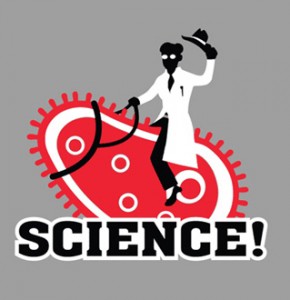Dear Popular Science Reporter,

I get that you are too-often overlooked. Unlike the gritty, seasoned crimebeat reporter who’s seen it all; the cynical, disillusioned-with-the-Process political editorialist who delights in swapping gossip by another name; or, the airbrushed, vapid and plastic news anchor whose only job is to provide a pleasing visual for delivery of what it says on the Teleprompter — your job is thankless and tough. You fill the online equivalents of “under-the-fold” news with Readers’ Digest versions of science articles, and mostly to justify your employers’ touting of its health-conscious positive news reporting.
And most frustratingly, you can’t even write about the genuinely interesting science. Rather than to talk about nanoparticle-based targeted drug delivery systems, bioengineered immunofluorescence-based molecular force transducers, or significant breakthroughs in our understanding of mTOR signaling, you’ve instead written countless stories about how a glass of wine is good for you at night (except when it’s not), how sex and chocolate can make you happy (albeit messy if consumed simultaneously), and how exercise is good for you (as long as you do ‘enough’).
But, please understand: in a day and age when most people want science parsed down to a simple yes-or-no answer about how to live one’s life as “healthy” as possible, when most people don’t realize that scientists contribute more than long droning diatribes about the mating behaviour of monkeys, and when most laymen don’t realize that science is cool and fascinating, you are one of science’s few remaining hopes.
Unlike most scientists, you have the ability (if not currently the interest) to write about compelling science news. You have access to readership that even the most high-impact factor journals like Science and Nature could only dream of. You have the capacity to write about how (and more importantly why) landing a rover on Mars will advance science, about how (and why) the Large Hadron Collider can change our fundamental understandings of the world around us, about how (and why) climate change is both a scientific fact and a solveable dilemma (scientifically if not politically), and about how (and why) stem cell research may provide the key to a host of diverse diseases that currently plaque humankind.
We are currently in an era when science knows a whole heck of a lot about the world around us. And yet, popular understanding of fundamental scientific breakthroughs lags far behind the leading edge of scientific discovery. Few Americans even understand basics of physics, chemistry, or even their own biology — fewer still are interested in exploring these ideas. This general ignorance is reflected in the unending political battle over evolution, NASA funding, and even the obesity epidemic. The average American’s science IQ is shamefully low; it’s no wonder that this country is getting obliterated in the international information race.
You, popular science reporter, can help change all of this. Here’s how:
1) Write about actual science. A quick perusal of CNN’s Health and Tech sections — the two areas where popular science reporting tends to be found — reveal a host of articles that belong more in the pages of “O” Magazine than in a hard news outlet. CNN’s popular health reporters write about studies focus almost exclusively on weight loss and diet tips, whereas its Tech section seems to be mostly a love letter to Apple’s mobile products. Most of MSNBC’s Science & Tech headlines describe latest developments in the video game industry. A major science story of the past weekend on both CNN and Fox News was how the Google Doodle was inspired by the 46th anniversary of Star Trek this year.

Here’s a novel idea, guys, how about writing about some actual science?
2) Write about important health & fitness science news. With the obesity epidemic afflicting roughly 1/3 of all Americans, it makes eminent sense to focus science reporting on scientific breakthroughs in obesity research and related diseases. But, here’s a tip: how about actually focusing on scientific breakthroughs in obesity research and related diseases? Ample digital ink has been spilled writing the same tired weight loss tips in the guise of pseudo-scientific reporting: how fat is bad and how 30 minutes of exercise a day can promote weight loss, and about the virtues of organic vegetables and a diet free from red meat. But — as a researcher whose work is loosely related to the obesity epidemic — there’s a lot more to obesity research than parroting the suggestions of Michelle Obama’s “Let’s Move” campaign.

With how prevalent obesity has become in America, isn’t it high time that Americans be treated with articles that actually bear some basic resemblance to our current scientific understanding of what obesity is and how it operates as a disorder? American readers are only stupid if you treat them like they’re stupid: we deserve articles that actually dare to treat concepts like “central adiposity”, “body fat percentage”, and “metabolic syndrome” honestly and head-on, rather than lost amid the sort of saccharine rambling best found in an episode of “Rachel Ray”. Is it, after all, hard to imagine that the first step in combating the obesity epidemic is by promoting better understanding within the American population of what obesity actually is?
3) Write about more than just health & fitness science news. Shocking as this might seem, science is devoted to far more than epidemiological studies that document the onset of various cardiovascular diseases in populations of obese vs. non-obese individuals — yet, this is the impression that I’m sure most Americans get of science based on the relative representation of science topics in popular news. A quick perusal of the most recent issue of Science reveals primary research articles that report novel findings in 1) how the photoreceptors of your eyes see, and how that vision becomes blurry in heat, 2) how the muscle fibers of our heart contracts, and 3) how populations of bacteria can form a competitive community to help them survive antibiotics. These topics may not change what you and I are going to have for dinner tonight, but they are food for our intellectual curiousity: they help inform our understanding of the world around us. They remind us that science is cool, and that there are no dumb questions.

And, fundamentally, American scientific IQ can only increase when we promote and encourage science and the intellectual curiousity that fuels it.
4) Read more than just the abstract. Too often, the popular science reporter will incorrectly summarize the findings of a recent journal article, often to fit the article into a preconceived popular “life lesson”. Take for example, this article which basically says going to failure — the point when a muscle can no longer lift a weight through the full range of motion of a given exercise any more — when weightlifting is almost equally beneficial whether you lift a heavy weight a fewer number of times to failure or if you lift light weights a large number of times to failure; either way, it is failure that stimulates muscle growth (although the latter type of training produces greater benefits to your muscle’s endurance capacity with some sacrifices to overall strength). A popular report of this article on LifeHacker — which like most popular science news articles only cited the journal that the article appeared in which is insufficient information to find the article in question — erroneously summarized the article as saying that light weights at an arbitrarily chosen combination of sets and reps were equally as effective as heavy weights.
Resistance training and muscle building exercises are intimidating to anyone starting to exercise and subsequently a lot of people stay away from it because they can’t imagine lifting the heavy weights. This research suggests that lifting small weights—even as low as 30% of your maximum—can have have nearly the same benefit as heavy loads. This is great news for people who shy away from muscle building resistance training because it means that small, less intimidating weights lifted with enough repetitions (three sets of 25-30 reps) have the same positive health effects as heavy ones.
The Lifehacker article basically used the article to incorrectly encourage women and/or beginner weightlifters to lift really light weights to avoid the “intimidation” factor of the gym. At not point does Lifehacker emphasize the point that the authors made in their study — that it was reaching failure, not the weight used to get there — that is important. This is an unforgivable example of shoddy reporting, and occurs because the authors of the scientific article didn’t emphasize the point regarding failure in their abstract and instead made this point in the discussion of their results in the full article. The Lifehacker article failed to grasp this important point in the science due to being the epitome of lazy reporting: they wrote a news summary based on reading only the paper’s summary.
5) Cite your sources.

Even if you do nothing else, please cite your sources. Too often, the popular science reporter assumes that his or her reader really doesn’t care about the primary source material, and instead is completely happy to allow the popular science reporter to serve as “geek translator”. But, this is neither always the case, nor does this actually benefit the casual reader of popular science reporting. The relationship currently established by the way popular science reports are written is that the scientist and the science should be separated from the reader, because of some imagined barrier in language or understanding; but this is both insulting to the science (and encourages us to write denser articles because we know only fellow scientists will read them) and patronizing to the casual lay-reader. To encourage readers to be able to find out more by examining the primary source material requires sufficient information so that anybody can track down the original article.
Yet, surprisingly, most popular science reporters fail to provide more than the name of a science journal as their only citation; this is equivalent to me “reporting” the following:
As published in GQ Magazine, former Alaska governor Sarah Palin threatened to a group of shocked reporters that if President Obama gets re-elected, she will divorce Todd and shack up with a bear.
I challenge you to find, with that information, the article that I purport to cite. The bottom line is, you can’t — I haven’t given you sufficient information to track down any such article, even with the use of likely keywords.
And yet, this is the journalistic standard that popular science reporters hold themselves to. A clinical study of obese, metabolically healthy patients received a write-up at CNN over the weekend, and was cited as “a new study… in European Heart Journal“. The name of the primary author was also included but still I spent twenty minutes on Pubmed searching with these two pieces of information and failing to retrieve this citation before giving up. Only when the study was later linked through an online forum was I able to read about it. And yet, there’s a simple — and well-established — customary structure for citing science articles; would it be so terrible to add a simple citation (or a link to the open-link, free Pubmed database entry) to every popular science article that summarizes primary research from now on?
Popular science reporters play an important role in improving the layperson’s understanding of science, and yet, you popular science reporters seem to stubbornly cling to a tradition of lazy reporting that shamelessly perpetuates a general ignorance of science and scientific discovery in your readership. I don’t know why you do this — I would imagine that better scientific reporting would only enhance the popularity of scientific reporting, leading you to better job security and maybe a certain degree of journalistic notoriety.
In short, popular science reporter, you can do better. I’m urging you, as both a scientist and a reader of popular science reporting, please try.
Sincerely,
Jenn
